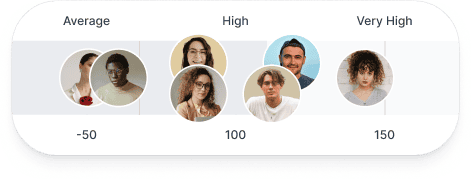Expect to take between two and six years to start your career as a software engineer. The exact time depends on whether you want a more or less direct route.
What higher education is required for this career?
About 75% of software engineers have graduated from a formal degree program2. Most likely, that means earning one of two degrees:
- Software engineering
- Computer science (typically with a software engineering specialization)
The global standard for a degree in software engineering is a bachelor of science. But you might also find associate degrees in software engineering, which have a more technical focus. A bachelor's engineering degree typically takes four years on average. An associate degree takes two years.
What licenses or certifications do you need?
Taking part in a certificate program can help you stand out in the job market. It shows both practical skills and a deeper understanding of relevant topics.
Some of the most popular certifications include:
- Certified software engineer, offered by the U.S.-based Institute for the Certification of Computing Professionals
- Certified secure software lifecycle professional, offered by the international cybersecurity organization (ISC)²
- Certified software development professional, offered by the IEEE Computer Society
You can also formalize your extensive knowledge by earning a more specialized certification. For example, you can become an AWS-certified developer through Amazon Web Services or get certified in a code environment such as Python.
What types of internships do you need?
Professional experience is essential to become a successful software engineer. Most job opportunities list at least some experience requirements, which an internship fulfills.
At your internships, you'll learn the basic concepts of software development. You'll be involved in hands-on projects that can look good in a portfolio.
Most four-year software engineering degrees include an internship requirement of at least three months. You can also seek out internships on your own. They're typically paid, and many of them include an option to start at the company full-time contingent on a mutual fit in skill set and company culture.
What advancement or specialization opportunities do software engineers have?
Once you get your foot in the door, the field of software engineering opens up a wide range of opportunities. Fully-fledged software engineers have plenty of opportunities to specialize.
For example, you can enter the field of AI and machine learning. You can focus on cloud computing. You can move into the gaming world. Your career options will only continue to grow as you gain experience and both soft and technical skills.
Focusing on your soft skills is vital. It ensures that you can continue to advance into leadership positions. Over time, you'll lead bigger teams, moving to senior engineering positions and even as high as CIO for your organization.
Can you become a software engineer without a degree?
A majority of people earn their degrees to enter this career path. But about 20% of professional software engineers worldwide don't have a bachelor's degree2.
Going against the traditional route allows you to enter the field more quickly. Self-taught software engineers can get a job in as little as two years. The opportunities for learning range from enrolling in courses to attending a software engineering boot camp.
The boot camp is a type of online school, between six months and two years long, specifically designed to give you basic skills and certifications. Schools from the University of North Texas to Harvard University offer coding boot camps, often at a fraction of the cost compared to a college degree.
The benefits of enrolling in a coding boot camp include speed of completion and being able to match your preferred learning style. But some employers, especially internationally, will only consider applicants with a degree. You'll need to rely more on personal referrals and employee referrals to get your foot in the door.
Building an online portfolio to improve your job prospects
An online portfolio can help to showcase your skills to earn your first programming job and/or advance into engineering. Use it to showcase any professional school, and personal projects you've worked on, including:
- Software applications
- Mobile applications
- Any source code you've developed
- Project management of larger development projects
- Processes and outcomes of software testing
- Any successful code challenge
Think of it as the center of your professional online presence. It's where potential employers go early in the interview process to learn about you and to create more specific questions for your interview.
How to interact within the software engineering community
Especially compared to other fields, this professional community is relatively close-knit. Tapping into a professional network of like-minded people can reap enormous rewards long-term.
Forums in online communities such as GitHub and Stack Overflow offer countless opportunities to network. But you'll also find plenty of people using them to stay up-to-date on the latest technologies. Use coding challenges to test your skills and connect with like-minded professionals.
Over time, you will become mutual friends with other engineers in your line of work. From there, it's only a matter of time before connections turn into personal referrals and career advancement.







.svg)



.png)

.svg)






%20(1)-2.png)
